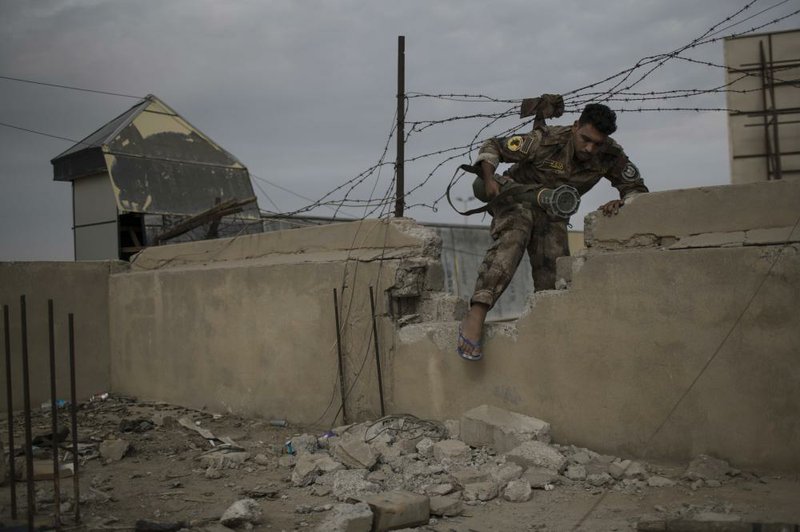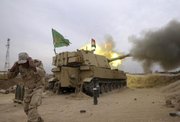MOSUL, Iraq -- Explosions and gunfire rattled parts of eastern Mosul, and Islamic State militants fired mortar rounds from apartment windows Tuesday as Iraqi special forces waged fierce urban combat in the country's second-largest city.
Hundreds of civilians filled the streets clamoring for food and cigarettes in recently retaken neighborhoods where supplies were running low. Some of the troops handed over their own rations.
Iraqi forces said they have largely cleared the neighborhoods of Zahra and Qadisiya in eastern Mosul after pushing into the area Nov. 4. The operation to retake the militant-held city began Oct. 17, and troops made swift progress before their advances slowed as they pushed into more densely populated areas.
Iraqi forces moving in from the south have maintained slow progress and remain more than 12 miles from central Mosul.
Mosul has been under the control of the extremists for more than two years and is still home to about 1 million civilians. Aid groups have warned of a humanitarian crisis if hundreds of thousands are forced from their homes during the military operation to oust the Islamic State.
"This is a problem for us because the food we have is not enough for them and we're waiting for more food to be sent from the government," said Maj. Salam al-Obeidi. "Now the Iraqi soldier is giving his food to the civilians."
Residents gathered in the streets to exchange news. A long line grew outside a shop selling cigarettes, where people argued and bought dozens of packs now that the extremists and their smoking bans are gone.
"Before, it was prohibited, cigarettes are prohibited," said one resident, Hani Hamed. "Now we are free to smoke, so they are buying lots of cigarettes."
Near the northeastern Zahra district, explosions and gunfire broke out as the special forces advanced. Islamic State militants fired mortar rounds on the troops from apartment windows in the al-Samah neighborhood, wounding at least seven civilians when the shells landed in the streets below.
The army set up a field clinic in an open area, with seven beds to treat wounded troops and civilians. Teaming up with foreign volunteers, Iraqi medics administered first aid before sending the wounded to a hospital.
In Qadisiya, a district that the special forces have repeatedly declared to be cleared, Islamic State fighters launched a fierce counterattack Monday, said Maj. Gen. Sami al-Aridi. Two dozen men in suicide vests charged the front lines in a three-hour battle that killed 20 militants and severely wounded a special forces soldier.
The Iraqi armed forces do not release casualty figures, but field medics have noted dozens of people killed or wounded since the battle for Mosul began.
At a news conference, Interior Ministry spokesman Brig. Gen. Saad Maan said the military has driven the Islamic State out of more than a third of the eastern half of the city, which is divided by the Tigris River.
"More than a third of this side has been liberated," Maan told reporters at the Qayara air base, a main port of entry south of the city.
Col. John Dorrian, a spokesman for the U.S.-led forces supporting the operation, said at the same news conference that airstrikes had destroyed 59 suicide car bombs and more than 80 tunnels.
"We will continue to strike the enemy for as long as it takes for the Iraqi flag to be raised over Mosul and every other corner of this country," he said, adding that the coalition had conducted more than 4,000 strikes with warplanes and artillery since the campaign began.
Smoke from oil wells and a chemical plant torched by Islamic State militants near Mosul has forced over 1,500 people to seek treatment for respiratory problems, the United Nations said.
The fires have spewed toxic smoke for 25 to 60 days, affecting 14 towns, the U.N. humanitarian affairs coordination office said. There could be serious mid- and long-term effects on health, the environment, agriculture and livelihoods, it added.
In Baghdad, meanwhile, bombings in and around the city killed at least 14 people Tuesday and wounded more than 50, Iraqi officials said.
The attacks targeted outdoor markets, Shiite pilgrims and Sunni tribal fighters who oppose the Islamic State, police said. The casualty figures were confirmed by medical authorities, who along with the other officials spoke on condition of anonymity because they were not authorized to release information.
Information for this article was contributed by Susannah George, Sinan Salaheddin and Brian Rohan of The Associated Press.
A Section on 11/16/2016


